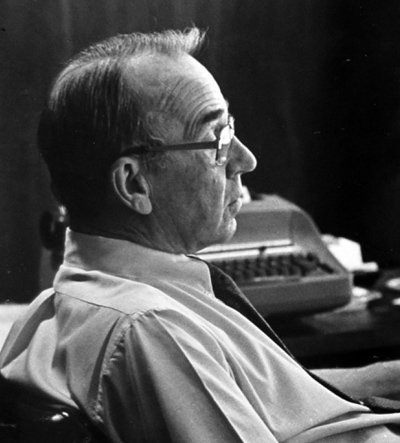
Biography
As a boy in 1920s Chicago, Walter Berns (1919–2015) watched survivors of the Indian Wars march down Michigan Avenue during the Memorial Day parade. At school, he memorized the Gettysburg Address and revered Abraham Lincoln as “a genius . . . our greatest patriot.” These beginnings sparked a love of country that led the political scientist throughout his long and distinguished academic career.
Although he read the Constitution in high school, Berns did not recall the document making a big initial impression. “I didn’t resolve then or have any idea of becoming a Constitutional scholar. That came later, in graduate school.”
Following a bachelor of arts degree at the University of Iowa, Berns studied as a non-degree student at Portland’s Reed College, where he discovered his love of politics. He then earned his master’s and doctoral degrees in political science at the University of Chicago. Berns was the John M. Olin University Professor Emeritus at Georgetown University and taught at Louisiana State, Yale, Cornell, Colgate, and the University of Toronto.
The author of seven books, Berns’ works on American governance and society appeared in the Atlantic Monthly, The New York Times, and the Wall Street Journal.
His works were often timely. In 1992 he edited After the People Vote: A Guide to the Electoral College, and testified before the House Subcommittee on the Constitution in 1997 against Electoral College reform. “Essentially, it’s better than any of the alternatives,” Bern said. “My attachment to it is in no way undermined by the 2000 election.”
In 2001 he published Making Patriots—a subject that would become of special interest following September 11. The World War II veteran doesn’t condone what he calls “blind patriotism,” favoring instead a Lincolnian devotion to the principles of a liberal democracy. “A loyal citizen would see to it the best he can that the country doesn’t drift away from those principles. For instance, if this country had joined the German Reich in 1940–41, that would have been a desertion of our principles,” he said in a 2004 interview. “An American patriot would have resisted that mightily.”
Even during wartime, Berns defended dissent. “Let me emphasize the point that a patriot can certainly disagree with his country. It depends on what that country is doing at that particular time. I would disagree with anybody who accuses somebody else of being unpatriotic because he’s opposed to the war in Iraq,” he insisted. “I don’t belong in that group. I favored the war in Iraq and I still have some hopes for it. But I can understand how someone who loves his country could be in profound disagreement with the war in Iraq and I would not accuse him of being unpatriotic, and I part company from anyone who does.”
A former delegate to the United Nations Commission on Human Rights, Berns served on the National Council on the Humanities from 1982 to 1988, and on the Council of Scholars in the Library of Congress from 1981 to 1985. Although a resident of Washington for over twenty-five years, he acknowledged a huge debt to his hometown.
“I owe a great deal to the University of Chicago,” said Berns. “In a way I owe much of the happiness in my life to the university. It was there that I became aware of what my career should be; it was there that I met my closest friends, who remained my friends; it was there that I met my wife fifty years ago. And what can beat that?”
—From the National Endowment for Humanities
